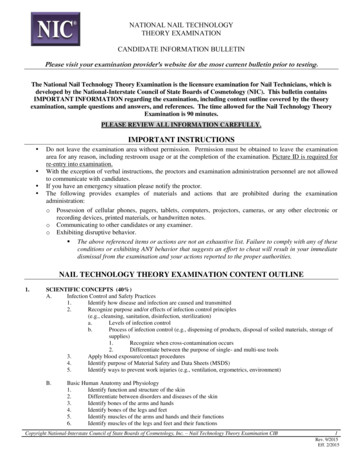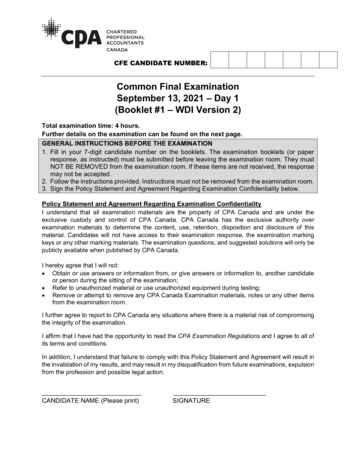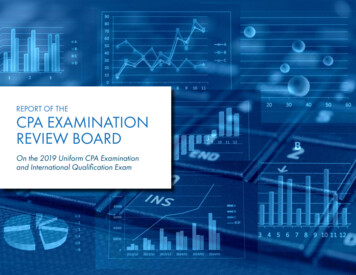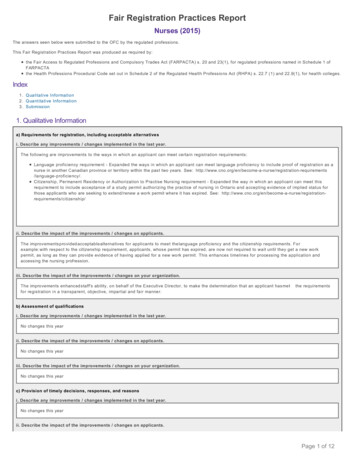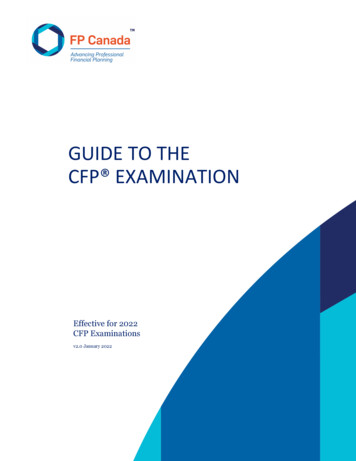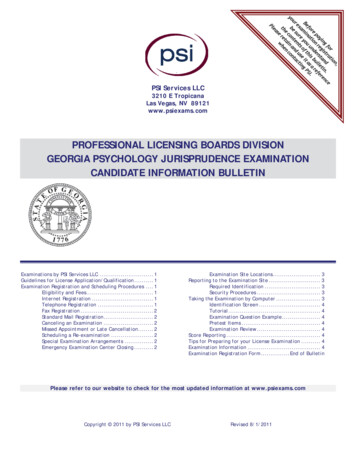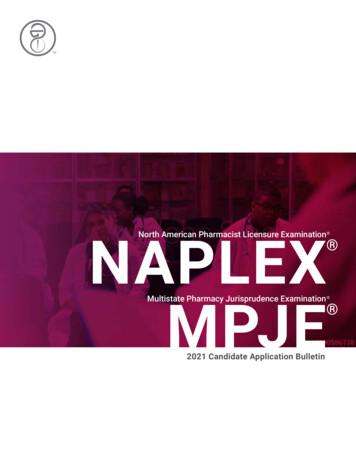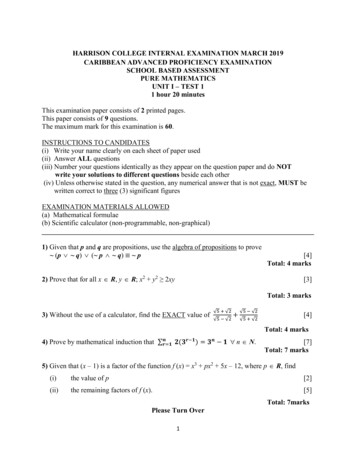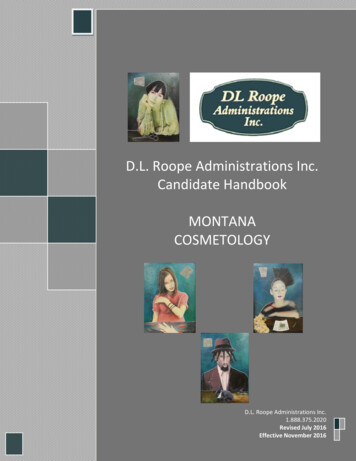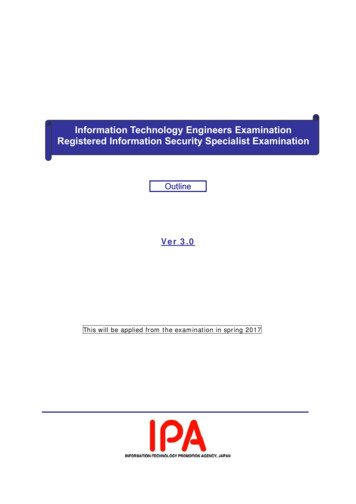
Transcription
Information Technology Engineers ExaminationRegistered Information Security Specialist ExaminationOutlineVer 3.0This will be applied from the examination in spring 2017
The company and products names in this report are trademarks or registered trademarks of the respectivecompanies. Also, this report does not specify and TM .
Contents1. Examination categories . 12. Typical examinees . 2(1) Information Technology Passport Examination [IP] . 2(2) Information Security Management Examination [SG] . 2(3) Fundamental Information Technology Engineer Examination [FE] . 3(4) Applied Information Technology Engineer Examination [AP] . 4(5) Information Technology Strategist Examination [ST] . 4(6) Systems Architect Examination [SA] . 5(7) Project Manager Examination [PM] . 7(8) Network Specialist Examination [NW] . 7(9) Database Specialist Examination [DB] . 8(10) Embedded Systems Specialist Examination [ES] . 9(12) Systems Auditor Examination [AU] . 10(13) Registered Information Security Specialist Examination [SC] . 113. Examination Time, Type, and Number of Questions and Answers . 134. Grading Method, Points Allocation and Pass Criteria . 155. Method and Season of Examinations . 176. Exemption System . 187. Scope of Questions . 19(1) IT Passport Examination . 19(2) Information Security Management Examination, Fundamental Information Technology EngineersExamination, Applied Information Technology Engineers Examination, Advanced Examinations, and RISSExamination . 23(Morning Examination) . 23[Table of Question Fields by Examination Category] . 24[Scope of Questions in Morning Examination (Information Security Management Examination)] . 25[Scope of Questions in Morning Examination (Fundamental Information Technology EngineersExamination, Applied Information Technology Engineers Examination, Advanced Examinations, and RISSExamination] . 29(Afternoon Examinations) . 38Information Security Management Examination (SG) . 38Fundamental Information Technology Engineer Examination (FE) . 38Applied Information Technology Engineer Examination (AP) . 39Information Technology Strategist Examination (ST) . 41Systems Architect Examination (SA) . 42Project Manager Examination (PM) . 43Network Specialist Examination (NW) . 43Database Specialist Examination (DB) . 43Embedded Systems Specialist Examination (ES). 44Information Technology Service Manager Examination (SM). 44Systems Auditor Examination (AU) . 45Registered Information Security Specialist Examination (SC) . 45(3) Information Technology Terms and Specifications of Programming Languages used in ExaminationQuestions . 46Reference About Syllabuses (Details of knowledge and skills) . 46Annex Breakdown of Number of Questions per Field in the Fundamental Information Technology EngineerExamination and Applied Information Technology Engineer Afternoon Examination . 47
1. Examination categoriesAs shown below, the Information Technology Engineers Examination and registered Information SecuritySpecialist Examination are conducted. The Information Technology Engineers Examiation consists ofthe “ITPassport Examination”, the “Information Security Management Examination”, the “Fundamental InformationTechnology Information Engineer Examination”, the “Applied Information Technology Engineer Examination”,and the Advanced Examinations (the “IT Strategist Examination”, the “Systems Architect Examination”, the“Project Manager Examination”, the “Network Specialist Examination”, the “Database Specialist Examination”,the “Embedded Systems Specialist Examination”, the “IT service Manager Examination”, and the “SystemsAuditor Examination”).- 1-
2. Typical examineesThe typical examinees, tasks and roles, the expected technology level, and the corresponding levels for eachexamination category are shown below.(1) Information Technology Passport Examination [IP]Individuals who have basic knowledge of information technology that all business workersTypicalshould commonly possess, and who are doing information technology related tasks, or trying toexamineesutilize information technology in their tasks in charge.Individuals who have acquired common basic knowledge of information technology that abusiness worker should possess, and utilize information technology in their tasks as well asperform the following activities:a) Understand information devices and systems to use, and utilize them.Tasks andb) Understand the tasks in charge, identify problems of those tasks, and act to provide requiredRolessolutions.c) Perform acquisition and utilization of information safely.d) Support task analysis and systemization activities under the guidance of superiors.The following basic knowledge is required as a business worker in order to determineinformation devices and systems, and to perform his/her tasks in charge as well as facilitatesystemization.a) Knowledge of computer systems and networks to determine the information devices andsystems to use, and knowledge of how to utilize office tools.b) Knowledge of corporate activity and related tasks in order to understand the tasks in charge.ExpectedAlso, in order to identify issues of the tasks in charge and provide required solutions,Technologysystematic thinking and logical thinking as well as knowledge of problem analysis andLevelproblem solving methodologies are required.c) Ability to act in accordance with relevant laws and regulations as well as various informationsecurity provisions in order to utilize information safely.d) Knowledge of development and operations of information systems in order to supportanalysis and systemization of tasks.Corresponds with Level 1 of the Common Career/Skill Framework for the 5 Human ResourceCorrespondModels (Strategist, Systems Architect, Service Manager, Project Manager, and Technicaling LevelSpecialist)(2) Information Security Management Examination [SG]Individuals working as information security leaders in a department that uses informationsystems, who understand the purpose and details of information security measures required forperforming operations of the department and information security regulations set forth by theTypicalExaminees organization (internal regulations of the organization, including information security policy), andwho ensure, maintain, and improve information security for safe use of information andinformation systems.Individuals perform the following tasks and roles for ensuring, maintaining, and improvinginformation security in the department that uses information systems:a) Performing operations required for maintaining information security of information assets inthe department.b) Identifying information assets of the department, conducting information securityassessment, and summarizing measures against risks.Tasks andc) Clarifying information security measures related to information assets of the department andRolesrequirements for continuation of information security.d) For procuring information systems, clarifying information security requirements necessaryto the department that uses the information systems. Also, for outsourcing businessoperations, clarifying the requirements of information security measures in the contract andverifying the status of their implementation.- 2 -
e) Ensuring information security in the department.f) Preventing information security incidents such as internal fraud by raising informationsecurity awareness and compliance of other members in the department.g) In the event of occurrence or likelihood of occurrence of an information security incident,taking appropriate measures based on information security regulations, laws and ordinances,guidelines, standards, etc.h) Proposing opinions and issues to the relevant divisions concerning information security inthe department or the overall organization.The following knowledge and practical skills are required in order to ensure, maintain, andimprove information security in the department that uses information systems;a) Capability to independently execute a part of information security management for thedepartment.b) Capability to appropriately deal with an information security incident as information securityExpectedleaders in the event of occurrence or likelihood of occurrence of an incident.Technologyc) Capability to understand basic terms and contents related to overall information technology.Leveld) Capabilities to collect case examples and trends from information security organizations andother companies and to evaluate the necessity of applying them to the department'senvironment, with basic knowledge of information security technology and informationsecurity regulations.Correspond- Corresponds with Level 2 of Common Career/Skill Frameworking Level(3) Fundamental Information Technology Engineer Examination [FE]TypicalIndividuals who have basic fundamental knowledge and skills required to be an advanced ITexaminees human resource, and who possess practical utilization abilities.Individuals engaged in the planning of basic strategy or in the implementation of IT solutions,products or services, and who perform either of the following activities under the guidance ofsuperiors.1. Participate in strategic planning that utilizes information technology in response to issuesTasks andthat a consumer (company management, social system) faces.Roles2. Build a highly reliable and productive system through design and development of systems,or through optimally combining (integrating) generic products. Also, contribute to therealization of stable operational services of systems.1. With regard to strategic planning utilizing information technology, the following knowledgeand skills are required, depending on the tasks in charge.a) Understanding of the basics of target business fields and tasks and capability to utilize thisunderstanding in his/her tasks in charge.b) Capability to perform projection, analysis and evaluation of information strategies under theguidance of superiors.c) Capability to participate in making proposals under the guidance of superiors.ExpectedTechnology2. With regard to design, development and operation of systems, the following knowledge andLevelskills are required depending on the tasks in charge.a) Understanding of the basics of information technology in general and capability to utilizethis understanding in his/her tasks in charge.b) Capability to design, develop and operate systems under the guidance of superiors.c) Capability to design software under the guidance of superiors.d) Understanding of policies of superiors and ability to develop software on his/her own.Corresponds with Level 2 of the Common Career/Skill Framework for the 5 Human ResourceCorrespondModels (Strategist, Systems Architect, Service Manager, Project Manager, and Technicaling LevelSpecialist)- 3-
(4) Applied Information Technology Engineer Examination [AP]TypicalIndividuals who have applied knowledge and skills required to be an advanced IT humanExaminees resource, and who have established their own direction as an advanced IT human resource.Individuals engaged in the planning of basic strategy or the implementation of IT solutions,products or services, and who perform either of the following activities independently.1. Devise strategy that utilizes information technology in response to issues that a consumerTasks and(company management, social system) faces.Roles2. Construct a highly reliable, productive system through the design and development ofsystems, or through optimally combining (integrating) generic products. Also realize stableoperational services of systems.1. With regard to strategic planning that utilizes information technology, the following knowledgeand skills are required, depending on the tasks in charge.a) Capability to understand the managements’ policies, accurately grasp the externalenvironment surrounding the management, and collect trend information and case studieswhen formulating business and IT strategies.b) Capability to conduct gap analysis, etc. based on predetermined monitoring indicators whenevaluating management and IT strategies.c) Capability to participate in discussing proposals and making parts of proposal documents.Expected2. With regard to system design, development and operation, the following knowledge and skillsTechnologyare required depending on the tasks in charge.Levela) Capability to organize system requirements and conduct surveys of applicable technologieswhen designing architectures.b) Capability to ensure stable operation and provision of services in the field concerned as amember of teams such as administration, operation, and service desk teams.c) Capability to manage scope, budget, process, quality, etc. as a project member under a projectmanager (leader).d) Capability to understand the policies of superiors and solve technical problems spontaneouslywith regard to the design, development, operation, and maintenance of information systems,networks, databases, embedded systems, etc.Corresponds with Level 3 of the Common Career/Skill Framework for the 5 Human ResourceCorrespondModels (Strategist, Systems Architect, Service Manager, Project Manager, and Technicaling LevelSpecialist)(5) Information Technology Strategist Examination [ST]Individuals who have an established field of expertise as an advanced IT human resource, andwho plan, propose, and promote basic strategies to innovate, sophisticate, and optimize certainprocesses with regard to business models and activities utilizing information technology, based onTypicalExaminees the company’s management strategies. Or, individuals who supervise the planning anddevelopment of embedded systems, and plan, propose, and promote basic strategies to realize newvalues.Individuals engaged in the planning, promotion, or support of business innovation, operationalprocess innovation, development of innovative products and services utilizing informationtechnology, and who take a leading role in the following while guiding subordinates.a) In accordance with the characteristics of businesses in different industry fields, formulatebusiness strategies utilizing information technology in order to realize management strategies,Tasks andand evaluate implementation results.Rolesb) In accordance with the characteristics of the businesses in different industry fields, formulateinformation system strategies and overall systemization plans for realizing businessstrategies, and evaluate implementation results.c) Formulate concepts and plans for individual systemization to realize information system- 4 -
strategies, and evaluate implementation results.d) Considering the prerequisites and constraints of each business, manage the execution ofreform programs comprising multiple individual projects in order to realize informationsystem strategies.e) As well as formulating development strategies for embedded systems, supervise the lifecyclecovering development, construction, maintenance, etc.The following knowledge and practical ability are required to execute the formulation, proposal,and promotion of basic strategies utilizing information technology in sections such as businessplanning, the promotion of operational process innovation, computerization planning, and productand service planning.a) Capability to advise on the analysis of the business environment, the analysis of informationtechnology trends, and the formulation of business models as well as capability to formulateor support business strategies. Also, capability to evaluate the achievement level of thebusiness strategies and provide feedback to management.b) Capability to conduct surveys and analysis of the target business and task environment, andformulate information system strategies and overall systemization plans. Also, capability toevaluate information system strategies and overall systemization plans.Expectedc) Capability to conduct survey and analysis of the target business and task environment,Technologyformulate concepts and plans for systemization of individual systems based on overallLevelsystemization plans, and procure appropriate individual systems. Also, capability to evaluatethe implementation results of the systemization concepts and plans.d) Capability to understand the prerequisites for implementing information system strategiesand reform programs, and monitor and control the realization of information systemstrategies. Also, capability to perform causal analysis, formulate and implementcountermeasures, etc. with regard to the risks in the realization of information systemstrategies.e) With regard to the development of new embedded systems, capability to plan competitivesystems based on analysis of related technology trends, social constraints and needs,intellectual property, etc. Also, capability to formulate and promote deployment strategies anddevelopment strategies in accordance with added values, extensibility, flexibility, etc.Correspond- Prerequisite for Level 4 of the Common Career/Skill Framework Human Resource Model of aing Level Strategist(6) Systems Architect Examination [SA]Individuals who have an established field of expertise as an advanced IT human resource, and inresponse to suggestions from IT strategists, define the requirements that are necessary for theTypicalExaminees development of information systems or embedded systems, design the architecture to realize thesystems, and for information systems, lead development.[Information Systems]Individuals engaged in the structure design of information systems for the realization ofinformation system strategies, the requirements definition needed for development, the design ofsystem methods and the development of information systems, and who take a leading role in thefollowing while guiding subordinates.a) Design the structure of the target information system from the perspective of overallTasks andoptimization in order to realize information system strategies.Rolesb) Analyze, organize and document the requirements needed for the development of targetinformation systems, in order to realize overall systemization plans and the individualsystemization concepts and plans.c) Design optimal system methods for realizing the requirements of target information systems.d) Based on the requirements and the designed system methods, conduct review of the design,development, testing, operation, and maintenance of software that satisfy the required quality,- 5-
and develop the target information systems.However, for specific technologies such as databases, networks, etc, accept support fromspecialists when necessary.e) Evaluate target information systems and the effectiveness thereof.[Embedded Systems]Individuals engaged in the survey and analysis of embedded system requirements, decidingfunctional specifications, and documenting the required specifications for hardware and software,and who take a leading role in the following while guiding subordinates.a) Based on the conceptions and development plans for embedded systems, survey and analyzethe functional requirements, technical requirements, environmental prerequisites, and qualityrequirements and determine the functional specifications of target embedded systems.b) Consider the assignment of functions to hardware and software to realize functionalspecifications, design optimal system architecture, and compile the required specifications forhardware and software.c) Formulate policies regarding the validity of introducing generic modules and the possibilitiesof reusing software assets that have already been developed.The following knowledge and practical skills are required to smoothly execute the tasks and rolesof Systems Architect.[Information Systems]a) Capability to correctly understand information system strategies and consider the overallorganization of task models and information systems.b) Capability to utilize both specialist knowledge of all types of task processes and knowledgeof systems, and to propose appropriate systems.c) Capability to make abstractions (models) of a company’s business activities and reconstructthem into a form in which information technology can be applied.d) Knowledge about best practices for each industry, the status of task processes in majorcompanies, and the task processes in many user companies of the same industry, specialistknowledge of each different industry, knowledge of industry specific practices, etc.e) Knowledge related to generic systems such as information system implementation methods,development methods, and software packages, and capability to select and apply themappropriately.f) Knowledge about basic elemental technologies with regard to operating systems, databases,Expectednetworks, etc. and capability to construct and maintain appropriate information systems,Technologyconsidering the technological risks and effects of those technologies.Levelg) Capability to establish appropriate evaluation criteria for the system operation, taskoperation, investment effects and task effects of information systems, and analyze andevaluate the systems.h) Capability to consider generalization of software and system services, bearing in mind thepossibility of deployment to many companies.[Embedded Systems]a) Capability to examine environmental conditions and quality requirements such as safety ofwhere the target embedded systems are used, and determine the functional specifications thatshould be realized.b) Capability to design appropriate combinations of hardware and software based on thefunctional specifications of target embedded systems and compile the designs as separaterequirement specifications.c) Thorough knowledge about real time operating systems and knowledge of generic modules,and capability to consider the possibility of reusing software assets and utilizing themappropriately.- 6 -
Correspond- Prerequisite for Level 4 of the Common Career/Skill Framework Human Resource Models ofing Level Systems Architects and Technical Specialists(7) Project Manager Examination [PM]Individuals who have an established field of expertise as an advanced IT human resource, andTypicalwho, as a person responsible for a system development project, prepare project plans, secure theExaminees required personnel and resources, and control and manage the project while taking responsibilityfor achievement of the planned budget, delivery date, and quality.Individuals engaged in the planning, execution and management of system development projectsas the person in charge of the project, and who take a leading role in the following while guidingsubordinates.a) Support the formulation of individual systemization concepts and plans as required, andprepare project plans for the execution of the relevant projects based on the individualsystemization concepts and plans that were formulated.b) Secure necessary personnel and resources, and establish project organizations.c) Manage budget, process, quality, etc. and run the project smoothly. Keep track of the state ofTasks andprogress, pick up and recognize problems and anticipated future issues at an early stage, andRolesimplement appropriate measures and actions to achieve project goals.d) Report appropriately to senior members and stakeholders on the project execution plans, stateof progress, issues, countermeasures, etc, and obtain support and cooperation to run theproject smoothly.e) Analyze and evaluate the project plans and achievements at the end of each stage and at theend of projects, or as needed and reflect these in subsequent operations of the projects as wellas provide them as reference models for other projects.The following knowledge and practical skills are required to smoothly execute the tasks and rolesof Project Manager.a) Understanding of the basics regarding organization management and IT systems.b) Capability to correctly understand the expectations towards the individual systemizationconcepts and plans as well as the projects, and prepare feasible project plans.c) Capability to reliably accomplish project goals under the prerequisites and constraints.Expectedd) Capability to manage personnel, resources, budget, process, quality, etc, unify overallTechnologyunderstanding of the project, and run the project.Levele) Capability to understand the state of progress of the project and anticipated risks at an earlystage, and deal with them appropriately.f) Capability to appropriately analyze and evaluate project plans and achievements. Also,capability to utilize the results in the subsequent operation of the projects as well as providethem as reference for other projects.Correspond- Prerequisite for Level 4 of the Common Career/Skill Framework Human Resource Model of aing Level Project Manager(8) Network Specialist Examination [NW]ndividuals who have an established field of expertise as an advanced IT human resource, and whoutilize specific technologies related to networks and take a central role in the planning,requirements definition, development, operation, and maintenance of optimal information systemTypicalExaminees infrastructures while providing technical support for the planning, requirements definition,development, operation, and maintenance of information systems as a specialist of specifictechnologies.Individuals engaged in planning, requirements definition, development, operation, andTasks and maintenance work for network systems, and who take a leading role in the following whileguiding subordinates.Rolesa) As network administrator, manage network resources which comprise the foundation of- 7-
information systems.b) Analyze requirements of the network systems and perform the planning, requirementsdefinition, development, operation, and maintenance considering efficiency, reliability, andsafety.c) Provide network related technical support for the planning, requirements definition,development, operation, and maintenance of information systems.The following knowledge and practical skills are requi
(1) Information Technology Passport Examination [IP] Typical examinees Individuals who have basic knowledge of information technology that all business workers should commonly possess, and who are doing information technology related tasks, or trying to utilize information technology in their tasks in charge. Tasks and Roles
